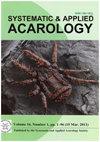Diet type and prey preference of predators affect intraguild predation between Amblyseius andersoni and Neoseiulus barkeri
IF 1.2
3区 农林科学
Q2 ENTOMOLOGY
引用次数: 1
Abstract
Abstract Amblyseius andersoni and Neoseiulus barkeri, two species of phytoseiid mites that are widely used for the control of small sucking pests, were found to co-occur on Chinese wolfberry in Inner Mongolia. We investigated the possibility of intraguild predation (IGP) between A. andersoni and N. barkeri to explore the interactions and coexistence of these two species. Predation and oviposition of the two predators on heterospecific juveniles were measured and compared with Tetranychus truncatus or Typha pollen as food, or without alternative food. The mortality rate of N. barkeri juveniles was not affected by the diet treatment, but that of A. andersoni juveniles was reduced by the presence of spider mites. The presence of spider mites also increased oviposition by A. andersoni but not by N. barkeri, and the presence of pollen had no influence on the oviposition of the two predators. Thus, according to the IGP criteria for gaining benefits from predation on heterospecific juveniles, it was concluded that IGP between A. andersoni and N. barkeri occurred, with A. andersoni as intraguild predator and N. barkeri as intraguild prey when spider mites were present. In a further choice test in which heterospecific juveniles and T. truncatus juveniles were provided for each predator, female A. andersoni preferred to prey on N. barkeri rather than on spider mites, whereas female N. barkeri preferred to feed on spider mites rather than on A. andersoni. These findings indicate that the higher preference of N. barkeri on T. truncatus might result in its lower predation on the other predator species compared with A. andersoni and, thus, increased the possibility of the coexistence of the two predator species. Therefore, the occurrence of IGP between A. andersoni and N. barkeri appears to be influenced by the availability and type of the diet and the prey preference of the predators.捕食者的饮食类型和猎物偏好影响安氏钝绥螨和巴氏新绥螨的场内捕食行为
摘要在内蒙古枸杞上发现安氏钝绥螨(Amblyseius andersoni)和巴氏新绥螨(Neoseiulus barkeri)共存,是两种广泛应用于小型吸虫防治的植物类螨。为了探讨安氏拟南毛蚁和巴氏拟南毛蚁之间的相互作用和共存关系,研究了两种物种间相互捕食的可能性。测定了两种捕食者对异种幼体的捕食和产卵情况,并比较了以截断叶螨和台风花粉为食物和不以花粉为食物的两种捕食者对异种幼体的捕食和产卵情况。饵料处理对巴氏乳螨幼虫的死亡率没有影响,但对安德氏乳螨幼虫的死亡率有降低作用。蜘蛛螨的存在也增加了安德氏螨的产卵量,但对巴氏螨的产卵量没有影响,花粉的存在对两种捕食者的产卵量没有影响。因此,根据异种幼虫捕食的IGP标准,得出在存在蜘蛛螨的情况下,安氏宜居螨和巴氏宜居螨之间存在IGP,安氏宜居螨是野外捕食者,巴氏宜居螨是野外被捕食者。在对不同捕食者分别提供异种幼体和长角斑蝽幼体的选择试验中,雌性安氏蠓更倾向于捕食巴氏螨而不是蜘蛛螨,而雌性安氏蠓更倾向于捕食蜘蛛螨而不是安氏蠓。这些结果表明,barkeri对truncatus的高偏好可能导致其对其他捕食者的捕食率低于andersoni,从而增加了两种捕食者共存的可能性。因此,安氏拟合螨和巴氏拟合螨之间IGP的发生可能受到捕食者的可得性、食物类型和猎物偏好的影响。
本文章由计算机程序翻译,如有差异,请以英文原文为准。
求助全文
约1分钟内获得全文
求助全文
来源期刊

Systematic and Applied Acarology
ENTOMOLOGY-
CiteScore
2.20
自引率
33.30%
发文量
152
期刊介绍:
Systematic and Applied Acarology (SAA) is an international journal of the Systematic and Applied Acarology Society (SAAS). The journal is intended as a publication outlet for all acarologists in the world.
There is no page charge for publishing in SAA. If the authors have funds to publish, they can pay US$20 per page to enable their papers published for open access.
SAA publishes papers reporting results of original research on any aspects of mites and ticks. Due to the recent increase in submissions, SAA editors will be more selective in manuscript evaluation: (1) encouraging more high quality non-taxonomic papers to address the balance between taxonomic and non-taxonomic papers, and (2) discouraging single species description (see new special issues for single new species description) while giving priority to high quality systematic papers on comparative treatments and revisions of multiple taxa. In addition to review papers and research articles (over 4 printed pages), we welcome short correspondence (up to 4 printed pages) for condensed version of short papers, comments on other papers, data papers (with one table or figure) and short reviews or opinion pieces. The correspondence format will save space by omitting the abstract, key words, and major headings such as Introduction.
 求助内容:
求助内容: 应助结果提醒方式:
应助结果提醒方式:


